
'Voting with their feet': the silent revolution that began in Tres de Febrero
Tres de Febrero is going against the grain of statist governments by lowering taxes and eliminating absurd regulations
While some local governments insist on squeezing taxpayers with absurd rates, in Tres de Febrero we're doing the opposite: we've lowered taxes, eliminated obstacles, and attracted investments. Economic freedom starts at home, with the municipal government.
In Argentina, talking about "fiscal competition" still sounds unusual. However, it doesn't have to be that way. While many mayors keep reciting the worn-out formula of increasing public spending and suffocating tax pressure, in Tres de Febrero we've decided to reverse the logic: fewer taxes, fewer obstacles, more investment, and more jobs.
Here we believe that people and companies should be able to "vote with their feet," as economist Charles Tiebout said in 1956. That is, to choose to live or produce where public resources are best managed and where the freedom to work, invest, and grow is respected. Tres de Febrero is already an example of that rational choice: more and more companies are moving to our municipality in search of tax relief, clear rules, and administrative agility.
Competition among municipalities or provinces works as a kind of "market" where families and companies seek to maximize the value they receive in public services in relation to the taxes they pay. This, in turn, encourages municipalities to review expenses, lower taxes, and improve services, so as not to fall behind and lose revenue, residents, jobs, and companies.
It's about having a tax system that's friendly to work and investment. Our tax regime is clear and forceful:
- From our municipality, we've promoted a Work and Production Ordinance that grants tax credits to SMEs that create jobs, invest in technology, export, or incorporate energy efficiency. The key is clear: those who produce and create jobs deserve incentives, not punishment.
- In addition, we have one of the lowest ratios of public employees to inhabitants, and one of the smallest organizational charts among the municipalities of Greater Buenos Aires.
- Every year, we work on our tax ordinance to eliminate government fat, reduce stamping and sealing fees, eliminate useless rates, and simplify procedures. Because no one should be a government messenger.
- We have one of the lowest Safety and Hygiene rates in Greater Buenos Aires, which represents real and ongoing savings for any company.
- Authorization cost: zero pesos (0 pesos, 0 pounds), regardless of size or sector. To those who start a business, we say thank you, we don't punish them.
- No absurd rates hidden in public services or fuel, as happens in other municipalities.
- Now we're going even further: an ordinance for tax stability that guarantees that taxes can only go down. A municipal RIGI with tax benefits for 15 years and an anti-blockade ordinance for companies, to guarantee the economic freedom granted by our Constitution.
Texan inspiration
Recently, we traveled to Texas to see up close how cities that lead in fiscal competitiveness operate. Houston, Austin, Round Rock: all demonstrate that if the government lowers pressure and frees the private sector, investments arrive (Dell, Tesla, Chevron, Samsung, etc.). On several occasions, President Javier Milei (a great promoter of these ideas) has highlighted the case of Elon Musk's companies that moved from California to Texas precisely because of the excessive taxes and regulations in the former. In reality, many companies have followed that path, voting with their feet.
In Round Rock, for example, Dell received benefits for 105 years, thousands of jobs were created, and the local government operates with a professional and efficient model, with direct participation from the private sector (Chamber of Commerce) in decision-making. Even the mayor and his council have a city manager who manages based on results, and you can fire him if he doesn't achieve his objectives. Because they understand that the government exists to serve the citizen, not to squeeze him, and their goal is to build a "business-friendly" city where the resident is a shareholder in the challenge of bringing in companies with quality jobs.
Concrete results: more jobs, more legality
We're already seeing it in practice: banks such as Nación and Santander are moving operations to our district. Large companies and SMEs are relocating their logistics or production centers. Gas stations maintain their sales because they're among the few that don't charge a road tax. The supermarket cart can be cheaper because we charge less tax on retail and wholesale sales. This is pro-market public policy in action.
Today, Tres de Febrero has the largest fleet of authorized cars in the country, with more than 5,000 cars (those you request through an app). Of those 5,000, 96% come from other municipalities to be authorized in Tres de Febrero. Why? Because here we don't charge for authorization and we offer the lowest bureaucracy in the country.
Meanwhile, while others inflate public employment and continue expanding structures and organizational charts, we free up resources for priority works and to lower rates. We make life easier for entrepreneurs, because the happiness of the people isn't caused by public spending but by an intelligent state that opens opportunities for private effort. This isn't just a government policy. It's a philosophy.
Economic freedom works. Lowering taxes works. Letting people live, work, and undertake in peace works. Tres de Febrero is now a laboratory of freedom and progress amid chronic statism. The results are clear. As we said at the beginning: people are already voting with their feet.
More posts: